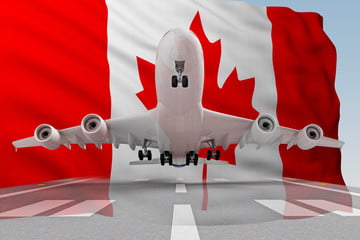July 20, 2020
How To Adapt Easily To Avoid Cultural Shock When Moving To Canada For Studies?
By Udit Kapoor
Each year, thousands of Indians are moving to Canada for their higher studies. It is widely considered to be a safe and welcoming country for immigrants, and as a result, attracts many international students. It has some of the highest-ranked universities in the world and offers a great experience no matter where you are from.
However, when you decide to go to a university that is literally on the other side of the world, you might see that a lot of the things around you are different. Studying abroad can be an incredibly daunting prospect, and the unfamiliar culture and experience can be quite a shock to you.

What Is Culture Shock?
When you are studying in a different country, you may face some difficulties at the beginning. The people behave differently, speak a different language and eat different kinds of food. You may not be familiar with the cultural norms, and the rules and regulations may be different in the country.
“Culture Shock” represents feelings of loss, confusion, stress and anxiety, caused by the challenge of being in new surroundings as well as the loss of a familiar cultural environment. It is a temporary negative experience felt by people moving to a different cultural environment, such as another country.
Stages Of Culture Shock
While every student faces a different kind of culture shock, it can be best explained by dividing it into four general phases that most students go through.
The Honeymoon Phase
Your initial few days at the University is going to be filled with euphoria and enthusiasm. You see a lot of new and exciting things around you, and you try to absorb as much of it as you can. Think of this initial period like a vacation you might have taken abroad; you are excited to be in a new country and a new culture.
People are also more social and easygoing in the first few days, which adds positivity to the environment and makes you feel happier.
The Crisis Phase
“I want to go home!”
Many students who go abroad for higher studies feel this way at some point or the other, and it is completely normal.
Soon after the happy honeymoon phase, comes the crisis phase. Once your high energy orientation week activities end, you start to get into the academic routine that is expected at the University.
This is the time where you might start disliking some of the things that intrigued you earlier.
If you are a vegetarian, for example, the dining hall burger and pasta might not seem an exciting choice of food to eat every day. You might start feeling alienated and confused.
The Adjustment Phase
A lot of students may feel like they made the wrong choice coming to Canada for their higher studies. But once you have been here for a few weeks, things start to fall into place.
If you understand that this is what is happening, congratulations! You are finally starting to get adjusted to your new life! This is the phase where you begin to accept the changes and appropriately adapt to them.

The Resolution Phase
Don’t let what is written above discourage you from going to Canada for your studies, for that is only a short and temporary phase.
You would slowly get into a routine that suits both your and others’ needs. This is a time you can confidently say you have overcome every obstacle that came in your way in the first few days or weeks.
Even though the journey may not be easy for everyone, this time would surely come for everyone when they are comfortable with their surroundings.
After this, the next few years of your studies would surely be one of the best few years of your life. Going forward, you may face more challenges, but they would not seem so challenging to solve.
Common Symptoms
While it is very common and normal to face “culture shock” when you go to Canada for your studies, it can be helpful to look out for these symptoms. This way, you would be better equipped to face the challenges you may face. Be on the lookout for these, or any similar symptoms.
- You become more angry, confused or irritable.
- You start spending most of your time alone.
- You are unable to concentrate on anything and feel left behind.
- You start to idealize Indian culture and people.
- You start to develop negative feelings about Canada and its people and culture and want to go back home.
How To Cope-Up With It?
Luckily, it is not very hard to cope up with the various impacts of culture shock. If you make a conscious effort to adjust to your new surroundings and follow these simple steps, you can make yourself feel at home in no time.
- Accept that, culture shock is a common affliction.
You are not the only one who has difficulty fitting into a new culture. Understand that cultural fluency isn’t achieved overnight; take enough time to come out of this challenging phase of your life.
- Give it some time
Living abroad, all alone can feel overwhelming. But it is important to remember that you will soon adjust to life in Canada just like thousands of other Indians every year.
- Learn the rules and social norms
It is essential to understand how people behave in Canada and how it is different when compared with India. This would enable you to easily mix in with the diverse crowd and not feel left out.

- Take time to improve your English.
While you may already be accustomed to speaking in English in India, you may feel overwhelmed when everyone speaks only English. Give some time towards improving your English skills so you can feel more confident when talking to people.
- Take good care of yourself.
Pay attention to your physical and mental health. Try to eat healthy food and exercise at least a few times a week. This would keep you physically fit and reduce stress.
- Push to make new friends
You need people to talk to in your life. Try to make as many friends as possible. You should also not worry about your friends being Indian, Canadian or any other nationality. Just be friends with whoever you feel comfortable with and enjoy.
- Maintain contact with friends and family
While it is important to make new friends, you should also not forget your friends back home. Talk to them whenever you get a chance; it will surely cheer up your mood. Also, don’t forget to call your family regularly.
- Get involved in activities.
Participate in cultural festivals or community work at your University. Or maybe join a club or two. This would help you make more friends and act as a healthy distraction for you.
- Seek help if needed
Talk to your friends and family about any problems you may be facing. Otherwise, you may also visit the international student centre at your University. They are trained in solving such issues faced by International students.
Apart from all this, I highly recommend all students to attend their university orientation. Not only is it a super fun and informative period, but it also helps you to meet lots of new people and better fit in.
Other Blogs
3
Feb

How to Qualify for Germany’s Opportunity Card: Eligibility Criteria Explained
Germany’s Opportunity Card offers skilled professionals an easier way to live & work in Germany. Learn about the eligibility criteria, points system, and more.
28
Jan

Why Choose German Public Universities for Your Master’s Program?
Discover why German public universities are ideal for a Master's: world-class education, tuition-free programs, vibrant culture, and excellent career prospects!
2
Jan

Germany’s Opportunity Card: A Game Changer for Skilled Professionals
Germany's Opportunity Card offers skilled professionals a simplified path to live and work in Europe's strongest economy, no job offer needed.


